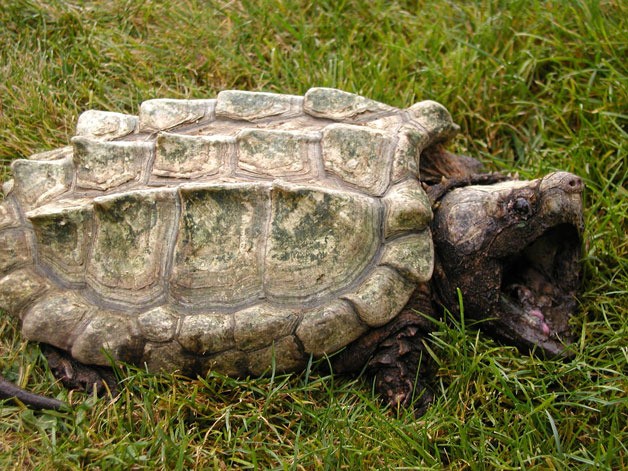Veterinarian David Parent never got a delivery like this before.
Just before noon on a recent Tuesday, a Sunlight Shores-area woman walked into Parent’s office in Freeland with a plastic laundry basket.
Inside: a turtle.
A very big turtle.
“It was probably 15 to 20 pounds,” Parent said. And healthy, too.
Though he’s encouraged people in the past to bring in any turtles they find — he’s been on the lookout for years for the rare Pacific Pond Turtle, and he’s seen his fair share of Western Painted Turtles — Parent said he wasn’t ready for this reptile. In the basket: an alligator snapping turtle.
“This is a new one for me,” he said. “I was surprised. I wasn’t prepared to see this monster.”
Alligator snapping turtles are among the largest freshwater turtles in the world, usually found in the southern United States.
“This is an exotic species, and they are big enough that they eat anything,” Parent said, including frogs, fish, ducklings. “Anything they can catch.”
They grow big, too.
“A hundred pounds or more. They get huge,” he said.
Parent said people usually bring in seven or eight turtles each year for him to examine. The alligator snapping turtle was the first one he’d ever seen in his 21 years on Whidbey Island.
“It was pretty friendly. He didn’t try to bite,” Parent said.
Parent said the turtle didn’t grow up here, but was likely abandoned.
“She was probably somebody’s pet and got too big and they let her go,” he said.
The turtle was found by a South End man who was walking his dog, said the woman who brought him to Parent’s veterinarian office. She did not want to be identified, citing privacy concerns. The turtle was sitting in a ditch not too far south from Bayview Road.
They brought it home, put it in their enclosed garden, then took the turtle — “Whidbey,” they named it — to Parent.
Whidbey’s stay on the island proved to be short, however. The couple contacted the “Reptile Man” Scott Petersen, and an employee from his zoo near Monroe traveled to Mukilteo to pick up the turtle.
Petersen shows his reptiles at schools throughout the region, and does about 800 programs a year. His zoo, the “Washington Serpentarium,” includes alligators, black mambas and anacondas, and other reptiles, including turtles.
Whidbey the turtle will join two other alligator snappers, a baby and a 50-to-60 pounder called Roxanne, one that Petersen named after an old girlfriend.
“I’ve never heard of an alligator snapper being found in the wild here,” Petersen said, adding that it likely was a pet that was let go or escaped.
“Without heat, I don’t think they can digest their food,” he said.
Despite the name, alligator snapping turtles are nowhere near as mouthy as the common snapping turtle, which is known for its unprovoked fierceness. Alligator snappers, not so much.
“They are very shy creatures,” Petersen said.
Down south, alligator snappers can fetch a hefty price, and they are commonly used in soup, Petersen said.
There’s a good chance that “Whidbey” will join his traveling show, which Petersen said spreads an important message that reptiles aren’t something to be killed simply out of fear.
“We’re not born with a fear of reptiles, but we learn to be afraid of them,” he said. “They don’t deserve the reputation they have. Most are very shy creatures.”
Snakes, for example, are very beneficial. They eat rodents, and that saves grains and crops.
“Snakes have been saving us from starvation for thousands of years,” he said.



